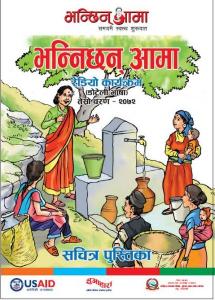Bhanchhin Aama Radio Discussion Group Comic Book Phase-III
Suaahara was a five year (2011-2016) project funded by USAID aimed to improve the nutritional status of women and children in 41 districts of Nepal. The project focused on improving health and nutrition behaviors at the household level through promotion of Essential Nutrition and Hygiene Actions (EN/HA), particularly Maternal, Infant and Young Child Nutrition (MIYCN), and addressing other determinants of under-nutrition, such as availability of and access to food, hygiene, quality of health care, child spacing and socio-cultural factors including gender and marginalization.
Suaahara was implemented by a consortium of partner organizations led by Save the Children.
The SBCC strategy established an internal quality materials review and production system to ensure that all partners in the consortium had mutually reinforcing, quality materials developed, pretested, produced and disseminated to the end user.
Bhanchhin Aama Radio Discussion Group Comic Book Phase-III
These comic books are pictorial discussion guides for Citizen Awareness Center groups that directly link to the Bhanchhin Aama (‘Mother Knows Best’) weekly radio drama and reinforce the Suaahara program’s integrated nutrition messages and model behaviors. Each week, the radio programs’ characters, issues and messages are discussed at the community level in radio discussion groups that are facilitated by Social Mobilizers and the Citizen Awareness Center groups from existing groups whose members are all from marginalized groups.
The Bhanchhin Aama entertainment education 39 episode radio program consists of two weekly programs. One is a 30-minute magazine-format (variety style) program which includes drama, vox pop, quiz and inspirational real stories. The second is a weekly program called “Hello Bhanchhin Aama” which is a recorded live call-in program where the trusted character of Bhanchhin Aama answers real questions posed by the audience or helps them find the answers from experts.
Suaahara developed and broadcasts three separate programs (Nepali, Awadhi and Doteli languages) in order to reach specific audiences and therefore there are three separate Comic Books – Nepali, Awadhi and Doteli languages.
Source: Johns Hopkins Bloomberg School of Public Health/ Center for Communication Programs
Date of Publication: March 25, 2019
SIMILIAR RESOURCES
Tools
Examples
- Suaahara Training Guidelines and Participant Handbooks
- Suaahara Health Facility Operation and Management Committee Capacity Building Training and Operation Guidelines
- Maternal Newborn Child Health - Nutrition Quality Improvement Tools
- GESI Toolkit
- Promoting Quality Malaria Medicine through Social and Behavior Change Communication
- Community Communication MNCH e-Manual: Participatory Health Promotion Sessions
- The Future of Malaria Social and Behavior Change Communication
- SBCC for Malaria in Pregnancy: Strategy Development Guidance
- Malaria Case Management: Monitoring and Evaluation for SBCC
- The Infection Control Symbol Package

